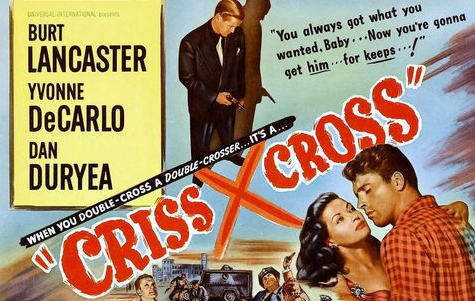Posted on March 26, 2023
Whenever I can’t come up with a current or recent title for our weekly movie night, I dip into my list of films noir. Last night, we pulled Criss Cross (1949) starring Burt Lancaster & Yvonne De Carlo.
It was enjoyable, but not nearly the master stroke of, say, Out of the Past (1947) or Gilda (1946) or, my favorite, The Big Sleep (1946).
Directed by Robert Siodmak, this one leans a little too heavy on the melodrama and tropes common to this genre.
Strictly speaking, film noir didn’t exist as a genre or even a concept when the term was coined by French film critic Nino Frank in 1946 and it didn’t really catch fire in Europe until the French New Wave of the 1960s. It was a genre created in retrospect by grouping together films with common patterns and devices; among them, flashbacks, a narrator, femme fatale, low key photography, anti-heroes, etc.
You can see these work like magic in Out of the Past. We start with Robert Mitchum as a small town garage owner in rural California, truly living his best life until he’s recognized by a gangster that just happens to be driving through.
From then on out, it’s a matter of him being dragged back into his bad past to put closure to unresolved and unforgiven sins against Kirk Douglas. Which are, of course, the worst kind of sins.
This is how it’s supposed to work in film noir: Start with the problem, flash back to how we got to the problem in the first half of the second act, then flip forward back into the problem for the back half of the second act, before careening into the conclusion where everyone dies.
No sins go unpaid for in film noir. Though that had more to do with the Hays Code than anything else. One of the prime commandments being, “Crime must not pay!”
In the case of Criss Cross, though, all that descends into melodramatic hugger mugger which has the unfortunate side effect of repeatedly releasing tension without resolution.
This story would have played out better if told in chronological order, starting with Lancaster’s character returning from drifting around the country trying to get over his toxic relationship with De Carlo’s character.
This would have allowed a steady degradation of their renewed relationship which would have built tension and suspicion. It would also have allowed the one set they re-used many times to degrade as a symbol of their failing relationship. Instead, the bar set never changes and it gets boring to look at which doesn’t help distract from everyone in the scene, Lancaster included, over acting to the point of comedy.
Much of the strife between the main characters seems unmotivated. Whereas in Out of the Past, the flashback provides a very clear description of how Jane Greer’s character manipulated and betrayed Mitchum’s character. We know what she’s capable of when cornered which helps build sympathy for Mitchum.
Speaking of which, Yvonne De Carlo is miscast in Criss Cross. She’s really more girl next door than femme fatale and the unmotivated sniping just makes her seem hysterical. On the other hand, Jane Greer has the smooth hard surface of chromium steel and you believe her sociopathic selfishness 100%.
And, finally, the ending of Criss Cross seems rushed and even tacked on. It’s also blocked so awkwardly that De Carlo’s final cry is awkwardly laugh inducing instead of terrifying.
Siodmak also directed The Killers (1946) which I haven’t seen in a while but I remember liking but also being a bit hammy and melodramatic as well as relying on multiple flashbacks. Criss Cross may just be emblematic of his style.
In any case, it’s still an enjoyable story. It just doesn’t belong on the list of top films noir.
Next time: Leave Her To Heaven


Recent Comments